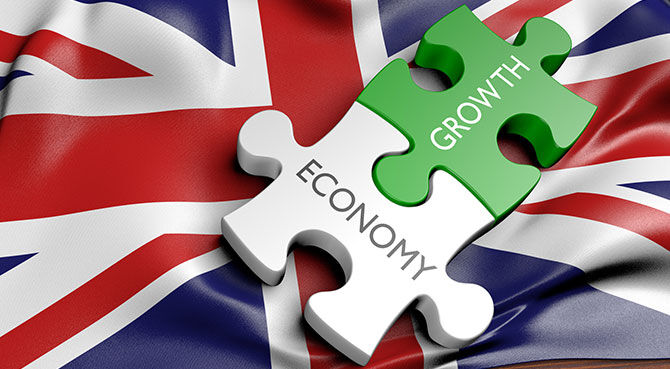Services spur unexpected growth in UK GDP
Positive news for the UK economy, as GDP growth was stronger than expected in the third quarter. Interest rates are now expected to rise imminently when the BoE meets in November.

Positive GDP numbers likely to affect interest rates
Analysts said the rise – above economists’ forecasts of a 0.3 per cent increase – had “probably sealed the deal” on a rise in base interest rates from 0.25 per cent to 0.5 per cent when the Bank of England’s Monetary Policy Committee (MPC) meets on 2nd of November.The increase was driven by healthy performances by both the services and manufacturing sectors, which helped offset a poor performance by the construction industry. However, GDP growth remains well below the 0.7 per cent notched up in the last quarter of 2016.Darren Morgan, head of national accounts at ONS, said, “Growth in the third quarter continued at a similar rate as seen in the first half of the year. Services, led by increases in IT, motor trades and retail, continued to drive GDP growth.“Manufacturing also boosted the economy with an improved performance after a weak second quarter. However, construction output fell for the second consecutive quarter, although it remains above its pre-downturn peak.”Productivity to become priority for UK government
Chancellor of the Exchequer Philip Hammond welcomed the figures but said the challenge now was to increase the nation’s productivity record, which remains one of the worst in the G7.“We have a successful and resilient economy which is supporting a record number of people in employment,” Mr Hammond said. “My focus now, and going into the Budget, is on boosting productivity so that we can deliver higher-wage jobs and a better standard of living for people across the country.“That is why I am visiting the Francis Crick Institute, where they are using cutting-edge research to generate real-life health improvements.“The UK has world-leading expertise in life sciences – an industry that employs hundreds of thousands of people – and it is through supporting growth in these cutting-edge industries that we will build a competitive economy that works for everyone.”Economy set for more positive 2018
Ruth Gregory, UK economist at Capital Economics, commented, “The third quarter figures leave the economy on track to grow by about 1.6 per cent this year. Looking ahead, with inflation likely to fall in 2018, the worst of the real pay squeeze should soon be behind us.“And sterling’s decline, along with robust global growth, should boost net trade over the coming quarters. As such, we continue to think that growth will be a reasonable two per cent or so in 2018.”Ben Brettell, a senior economist at investment firm Hargreaves Lansdown, said the rise in GDP growth increased the chances of an interest rate rise next week. “Following recent hawkish comments from the MPC, markets were already regarding a return to 0.5 per cent as a near certainty,” he said in a note.Manufacturing experiences unexpected growth
But Ross Andrews, director of fixed rate bond provider Minerva Lending, said the Bank of England still might have second thoughts on a rate rise next week. “We’ve had slight upward revisions on this scale already this year so while it’s welcome that the numbers are running slightly ahead of expectations, it’s not going to set anyone’s newspaper on fire.“Of most interest is the unexpected bounce back in manufacturing growth because manufacturing optimism slumped noticeably during this quarter.“What will be playing on the minds of those in the corridors of power is the muted response in the figures given the good news we’ve had of late. Consumer confidence was running at a six-month high in September and a fallen pound has helped lighten the export mood recently alongside robust consumer spending.“If all we can muster, in terms of a payoff, is an acceleration in economic growth that’s so small you could blink and miss it, the Bank of England could still think better of a rate rise next week.”Related articles:
- German regulator tells banks: ‘speed up relocation plans’
- Weakening construction sector boosted by HS2 contracts
- Interest rates rise looms as inflation hits five-year high
Brexit related uncertainty potentially slowing progress
And Peter Dixon, economist at Commerzbank, felt the Q3 growth should not be celebrated. “UK GDP growth was a little bit above what we had expected but still below the rates of growth we enjoyed back in 2016 as service sector growth appears to be running around one- or two-tenths slower,” he wrote.“This in turn may be a consequence of the weakness of consumption, triggered by the recent inflation pick-up which itself is a consequence of the Brexit-induced collapse in sterling. All in all, it appears that the economy is running around 0.5 per cent per year more slowly than prior to the EU referendum.”Prof Costas Milas, from the University of Liverpool’s Management School, agreed. “Brexit-related economic uncertainty is taking a toll on the economy not only in terms of getting stuck to 1.5 per cent annual growth for 2017 Q3 but also in terms of the ‘quality’ of the reading itself. Indeed, since the Brexit vote, the first reading of ONS has over-estimated annual GDP growth by a notable average of 0.3 per cent.”For related news and features, visit our Enterprise section.Relocate’s new Global Mobility Toolkit provides free information, practical advice and support for HR, global mobility managers and global teams operating overseas. Access hundreds of global services and suppliers in our Online Directory
Access hundreds of global services and suppliers in our Online Directory
©2026 Re:locate magazine, published by Profile Locations, Spray Hill, Hastings Road, Lamberhurst, Kent TN3 8JB. All rights reserved. This publication (or any part thereof) may not be reproduced in any form without the prior written permission of Profile Locations. Profile Locations accepts no liability for the accuracy of the contents or any opinions expressed herein.






























